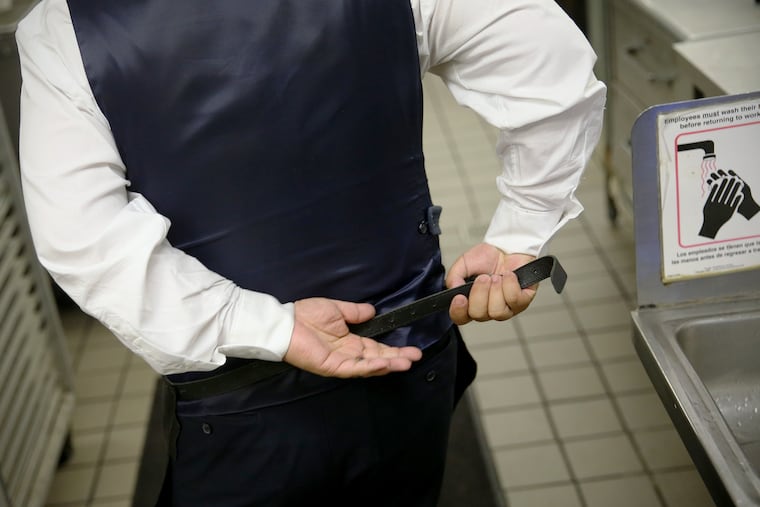Philly restaurant veteran on what we’re really losing when our favorite spots close | Opinion
After a year or more of hands-off, pared down, minimal contact service, it won’t be so simple to just flip the switch back to warm and inviting hospitality.

Cheu. Res Ipsa. Boot & Saddle. City Tavern. Continental Old City. Lalo. It’s at the point where enough restaurants have closed since March that Philadelphians can compare which of their favorite hangouts are gone, as opposed to the usual trading of happy hour and Restaurant Week recommendations.
Our devoted patrons will lament the loss of their favorite quick noodles, or their go-to for visiting relatives. City and state legislators will press their trusty “Economy and Jobs!” buttons on the microphones. But after 20 years of service in Philadelphia — from summers behind the counter at Bassetts Ice Cream, to the gleaming concierge desks of hotels like Loews and the Rittenhouse, to the three bells our amazing team earned from Inquirer food critic Craig LaBan when I was the general manager at Cheu Fishtown — what I see on the bleak horizon is a desert of training and development.
Cheu wasn’t just seven years of affordability, consistency, and reliability for diners. It was seven years of well-built systems and experience in high volume and efficiency. Boot & Saddle wasn’t just a place where local people could hear local music. it was a training ground for beer knowledge, quick cocktails, and crowd control. Mama’s didn’t just serve plant-based food. It taught plant-based cooking to its staff. With more restaurants dying every day, the city is losing the institutional knowledge in its kitchens and bars.
» READ MORE: With indoor dining shut down, some Philadelphia restaurants are closed until next year
To the uninitiated, the changes will be imperceptible at first, lost in the crowd of QR codes, face shields, posted time limits, and paper plates. But they will come swiftly. After a year or more of hands-off, pared-down, minimal-contact service, it won’t be so simple to just flip the switch back to warm and inviting hospitality. I hope the Yelp and Google review crowd is prepared.
In the kitchens, while owners and GMs and chefs struggle to maintain food cost and labor margins (while rent and ingredient prices remain the same), I imagine that you will see reliance on large-scale, shelf-stable preparation, decreased diversity of ingredients, and menu structure designed to adhere to working with minimal staff as cheaply as possible. Not exactly an exciting culinary prospect.
One of the best things about working in the restaurant industry in a city like Philadelphia is that we all know one another. (Full disclosure: It’s also one of the worst, but that will have to be the subject of a different op-ed.) When we see a year at Continental Mid-Town on a resumé, we automatically know that meant quick table turns, adherence to brand standards, solid steps of service, and menu knowledge. We know the managers and chefs in each kitchen, and we know where they all trained. We know one another’s service styles, values, and methods. And when we see one of these dining rooms or kitchens on a resumé, we can build and develop our own staff with the confidence that they have learned and grown with their previous employers.
With each heartbreaking Instagram post, that pool of confidence evaporates.
» READ MORE: Craig LaBan | With no relief in sight, Philadelphia restaurateurs feel like ‘it’s slipping away’
With each article telling the story of a darkened dining room, I see veterans walking away and their future barbacks, supervisors, and sous running for any other industry they can. And who would blame them?
You’re losing your neighborhood spot. We are all losing the future of one of Philadelphia’s biggest selling points.
We’ve spent the last 20 years building on the legacy begun by the likes of Georges Perrier, Susanna Foo, Walter Staib, and Neil Stein. Something like that doesn’t just “bounce back.” You don’t just get to tear down the plastic and burn the masks in the middle of the City Hall courtyard and go back to normal. Good service is funny like that. When it is amazing, you hardly realize it because you’re lost in the very atmosphere that was intended. But when it’s bad, you’re going to see every misplaced grain of sand. The former takes time. The latter certainly does not. Guess which you’ll find plenty of in the coming desert of training?
This is not a throwing up of double-gloved, sanitizer-soaked hands. We will maintain. We will reopen. We will continue to hold ourselves and our staff to the standards that we designed, let alone in which we merely believe. But it will take more than a weekly takeout splurge and an Instagram post with the heart gif.
Restaurants need rent relief. Their landlords, of course, will need help, as well. The servers and bartenders who make $2.83 per hour with 50% of the guests need rent relief and stimulus money. You can’t just close a block of Second Street, dust off your “mission accomplished” mask, and wait for the vaccine. Save Philadelphia’s restaurants. For Philadelphia’s sake.
Benjamin Palubinsky is general manager of Lucky Strike Philadelphia.